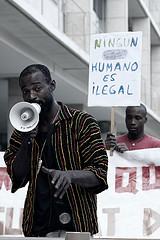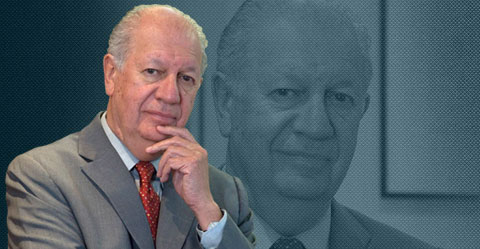If Prehistory is the longest period in History, then humanity has spent the majority of its existence living a nomadic rather than sedentary existence. Hunter-gatherer communities moved from one place to another seeking food and refuge for many centuries while sedentary existence only began with the discovery of agriculture, which offered an opportunity to definitively live in a determined territory. Migration, then, is an ancestral right.

Ramon Fornell via Compfight cc
According to a United Nations report, there are currently 200 million people living outside of the country of their birth. These people; 3% of the world population, are generally young and fleeing poverty, violence or civil wars in search of richer, more peaceful countries. The simple decision to cross a border is an act of bravery. Utterly vulnerable, they expose themselves to extortion and abuse, pay very large sums of money to smugglers, and willingly put their lives at risk. On the other side, a new battle begins: one for survival. This was the case of Bertín from Cameroon who paid 1500 euros to swim across the Mediterranean, and Jorge from Honduras, who managed to cross the dangerous Mexican border after two years of failed attempts. However, on the other side, their dreams were not realized. As illegal immigrants without jobs, stable shelter or social security, life continued to be a nightmare.
The failure of migration policies in the United States and Europe and the lack of them in other countries presents us with a global migration crisis that will be difficult to address. The contradiction between the universal commitment to human values and the growing anti-migration sentiment, accentuated by extremist discourse from certain quarters, creates a series of new social, legal and cultural problems that won’t be resolved by building walls or patrolling borders.
Given that we share exterior borders, we should also share joint responsibility for the migration phenomenon. To do this we must move on from a social and public model based on the individual to a collective, global model. I.e.: we must come up with an international strategy – not a different one for each country – and recognize the collective rights and identities of migrants. To achieve this it is crucial that we widen our gaze and see migrants as a source of economic development as well as subjects for social policy. Migration contributes new human resources that drive the growth of the region where they arrive and contribute to a general transformation into a more diverse and pluralist society. The training of migrants, to make them into better workers and citizens, must thus be the same as that available to people born in that territory.
This transformation would involve teaching people to really see others, adjusting our education to help us to relate better and see diversity as an opportunity rather than a threat. This is the only way to create societies that are more open to differences, more welcoming and inclusive, in an age where we are becoming more and more nomadic.
Leave a comment



